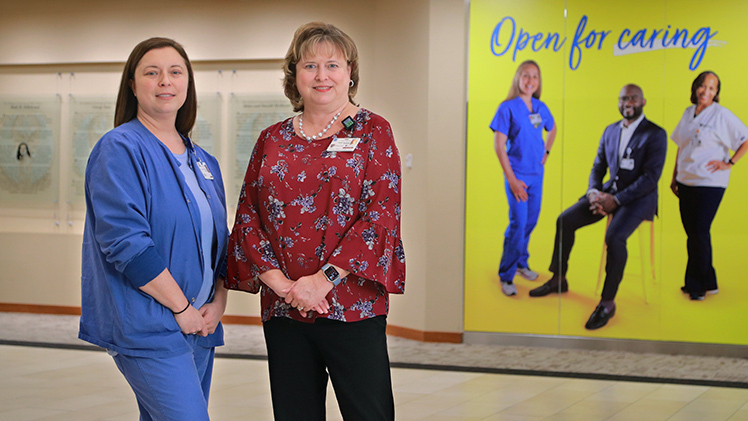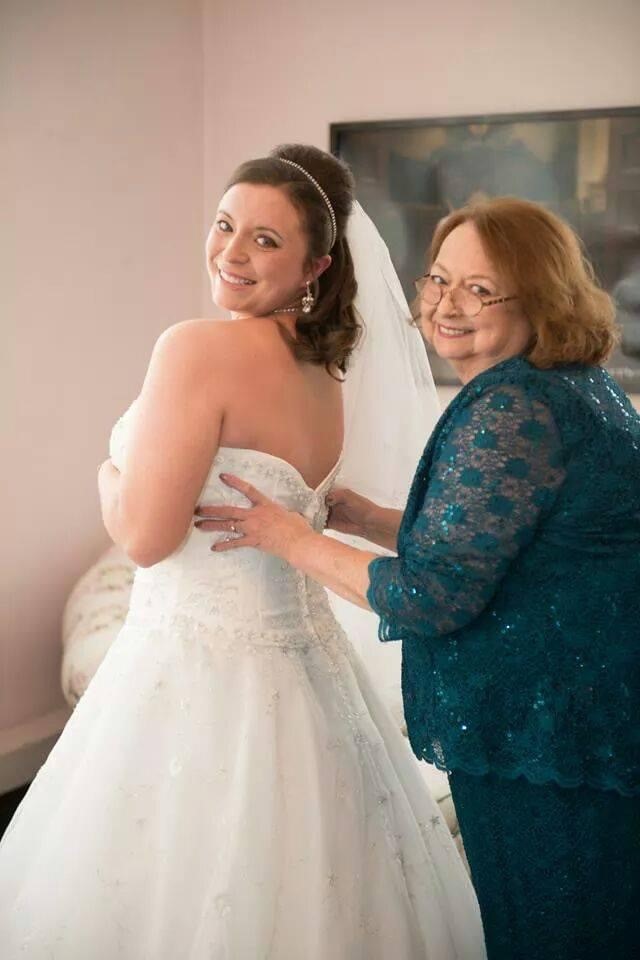Tracy Pakulski vividly remembers her mother’s head resting on the steering wheel after a doctor’s appointment in downtown Toledo.
Pakulski, who was about 6 years old at the time, was with her mother, Sheila Bondy, when Bondy learned she had polycystic kidney disease — a serious genetic condition that her doctor said would take her life.

Sisters Bethany Liedel, left, and Tracy Pakulski, who both suffer from polycystic kidney disease, are among the featured speakers at a celebration today recognizing UTMC’s 3,000th kidney transplant.
Though Pakulski couldn’t have known it at the time, it was a diagnosis that would in many ways come to define her life and forever connect her family to The University of Toledo Medical Center.
After seeing doctors at the Cleveland Clinic and the Mayo Clinic, Bondy ultimately had a pair of kidney transplants at UTMC, first in 1992 and again in 2007.
Years later, Pakulski and her younger sister, Bethany Liedel, would undergo their own transplants at UTMC because of the hereditary disease.
“When I come to work every day and I look at that hospital,” said Pakulski, who has now worked at UTMC for more than two decades, “all I can think about is the great things it’s done for my family. It’s almost like coming home. My family spent so much time here and it made so much difference in our lives.”
Pakulski and Liedel — who also works at UTMC — will join other invited guests today at the Center for Alumni and Donor Engagement for a celebration of UTMC’s kidney transplant program, which earlier this summer completed its milestone 3,000th procedure.
The event will feature leadership from the University and hospital, surgeons, nephrologists and others who support UTMC’s kidney transplant program, as well as a number of kidney recipients and living donors.
Pakulski and Liedel are among the scheduled speakers.
Polycystic kidney disease causes cysts to grow throughout the kidneys. As the cysts multiply, kidney function is reduced to the point of failure.

Bethany Liedel and her mother, Sheila Bondy, at Liedel’s wedding.
The condition is hereditary and rarely occurs as a spontaneous mutation in individuals. Approximately 500,000 people in the United States are affected by this entity, said Dr. Deepak Malhotra, a UTMC nephrologist who has cared for Pakulski, her sister and her mother.
“The normal kidney is about the size of a fist,” Malhotra said. “With this disease patients develop so many cysts that the kidney can in some cases be as large as a football. There is a drug out there that we’re using to slow the progression, but there is no treatment. Patients will eventually need dialysis or a transplant.”
Liedel and Pakulski reached that point in 2019. They received their transplants within two weeks of each other in November of that year, Liedel from a living donor and Pakulski from a deceased donor.
Their mother was there with them.
“The transplants made it so she could take care of our sister Alicia, who had serious disabilities. The transplants allowed our mom to continue to be part of her grandchildren’s lives. She got to go to baseball games, she got to go to graduations,” Liedel said.
“She got to see me get married and got to plan a wedding that I wasn’t sure growing up she was even going to be at. She got to see me have a baby and she got to be at our sides before we had transplants. If you want to talk full circle, I don’t know how you get any more full circle than that. This place has touched our entire family.”
Liedel, who joined UTMC in 2022, works as an operations analyst in the Department of Surgery. Pakulski is the procurement manager in purchasing.
Both are doing well since their procedures nearly four years ago.

Left to right: Sheila Bond with granddaughter Alli Pakulski and daughter Tracy Pakulski.
“It’s amazing how far transplant has come,” Pakulski said. “Beth and I live normal lives and work at the University because of the wonderful things that Dr. Malhotra and his group did for us. We are forever grateful.”
Beyond being advocates for UTMC, the sisters have become proponents for what’s possible after a kidney transplant, lending an ear to others going through similar situations and, when presented with the opportunity, sharing their stories with patients who are preparing for their own transplant.
As they reflect on the care UTMC has provided their family and the hospital’s celebration of its 3,000th transplant, Liedel is struck not by that number, but by the lives that have been changed.
“It’s so much bigger than just the 3,000 kidneys. If you think about the impact on our family and the trickling effect going forward for others, it does so much for our community,” she said. “Every single transplant is not the same. Everybody doesn’t go back to work, or go on to have kids, or volunteer 100 hours a year, but some of us do. This wouldn’t happen if we didn’t get these opportunities.”
Their mother died in 2020 at the age of 67, decades after being given what at the time seemed like a death sentence.
“It is truly because of the doctors and staff here that she was provided with so much time. She entrusted this place with her own children knowing we would need care at some point,” Liedel said. “We wouldn’t be where we are if it weren’t for this place. It’s touched our entire family.”